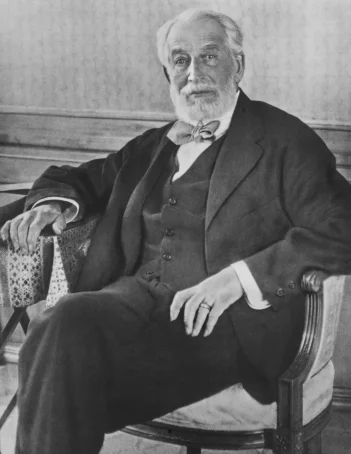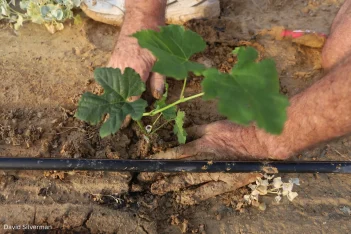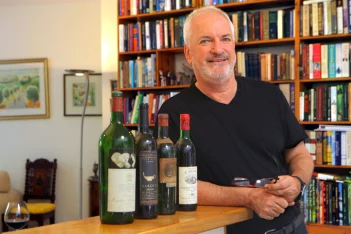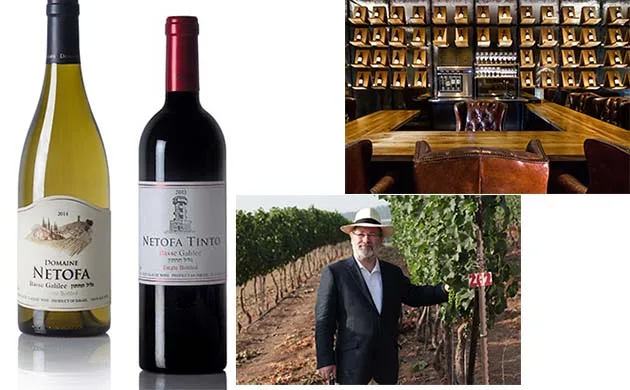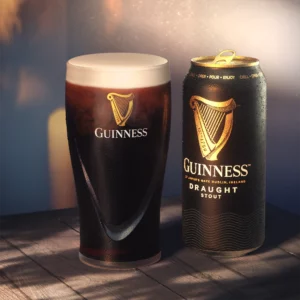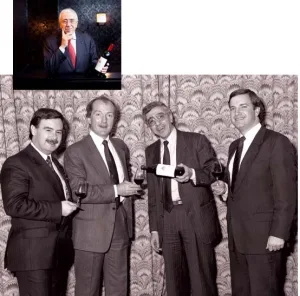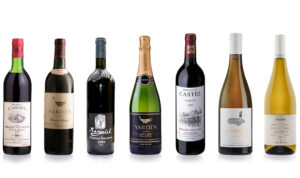Netofa Winery beats the drum for wines of the old world. The name of their one of their labels, Domaine Netofa and the growing region written on the label, Basse Galilee, give a clue. There is a French connection here somewhere.
Of course when you meet the winemaker, Pierre Miodownik, all becomes clearer. He was born to parents of Polish origin. That explains the name. They came from Lublin and settled in France way before the Holocaust. They lived in the Languedoc in a place called Beziers. Now this is a big wine producing area which produces more wine than the whole of Australia together.
Here the young Pierre learnt his winemaking as an apprentice, ‘on the job’, by helping out at the wineries around him and he fueled his Zionism, by working on a kibbutz. Gradually, he was able to find a niche making much needed kosher wine at non-kosher wineries, but as he became more knowledgeable and experienced, it frustrated him that kosher wine was not better quality.
He received his opportunity when Baron Edmond de Rothschild (grandson of Hanadiv – The Known Benefactor), decided to make kosher wine. He needed a religious winemaker. Miodownik fit the bill. Together they made the first quality kosher wine in France in 1986.
Then, Royal Wine, the world’s largest importer & distributor of kosher wines, thought if he is good enough for Rothschild, then he is good enough for us. He had made wine which they had sold previously. For the next 28 years, Pierre Miodownik became the European winemaker for Royal Wine making kosher wines in France, Spain and Portugal. He helped make kosher cuvées at some fairly famous wineries including Bordeaux Chateaux Giscours, Léoville Poyferré, Pontet Canet and Taylors Port in Portugal.
After becoming the main figure of Kosher winemaking in Europe, he then decided to conquer Israel. Pierre combined his winemaking skills, with his Zionism and religion by founding a winery in Israel. He made aliyah with his wife Corinne and seven children. Knowing the most important thing in a winery is the vineyard, he first planted a vineyard in the Lower Galilee.
Netofa Winery has 120 dunams of vineyards which are lovingly grown with great expertise in the Ein Dor area, in the foothills of Mount Tabor in the Lower Galilee. The first vintage was 2009, and first complete vintage was 2010. They now already produce 75,000 bottles a year.
The winery has a dream team. Apart from Miodownik’s winemaking skills and French charm, the winery has a sharp, savvy wine knowledgeable CEO, Yair Tebboulle, who was born in Israel, but his father was from Bordeaux. Then there is Yitzhak Tor, a man of the soil, who has a lifetime experience in vineyards and Israeli agriculture.
Shahar Marmor is the viticulturist managing the Netofa vineyards. He is from one of the founding families of Tabor Village. He studied winemaking in Margaret River, Australia and is young, good looking with some experience at Carmel & Amphorae wineries. He is undoubtedly a great asset to Netofa, because he understands better than most, the difference between growing grapes and growing wine.
They make the wine at Or Haganuz Winery. There is nothing wrong with that. There are many negociant wineries and negociants who make their wine at another winery or at what is known as a ‘custom crush facility.’ As Or Haganuz has the quality equipment and the capacity, why not It certainly makes good sense financially.
The Israeli wine revolution was made with Bordeaux varieties. Cabernet Sauvignon, Merlot and Sauvignon Blanc were the first Israeli wines to be noticed for quality. However, today the worm is turning. Mediterranean varieties are in and Netofa is one of the new wineries leading the way.
Pierre Miodownik selected grapes which are Mediterranean in origin and considered more suitable for the Israeli climate. These include Syrah, Mourvèdre, Grenache, and Roussanne from the region where Pierre cut his winemaking teeth. To these he has added a touch of Spanish & Portuguese planting Tempranillo and Touriga Nacional.
He loves Chenin Blanc and this is where his main focus on whites. He had experience of this making wine in the Loire Valley. He likes this variety, its quality, the way it develops all the time and its ability to age. Chenin is the comeback kid of Israeli wine and there are few wineries that swear by it. Certainly it is something different from Sauvignon Blanc and Chardonnay all the time!
I drove north to Mitzpe Netofa to visit the winery, and instead was welcomed to one of the most luxurious wine rooms in the country. Firstly it is slightly secret and secluded. It may be found in a side entrance to a rather grand synagogue building, which already gives an expectation of quality. Netofa’s wines are good, but with divine assistance as well, they are even better!
You enter a heavy sliding door, unmarked from the outside and imagine you have gone into a gentleman’s cigar club in the West End of London. The room is plush and exudes quality. You are in a wine den, with low lighting. There is a chunky table surrounded by eight easy, plush leather armchairs. Sit in one of these, and you don’t want to move. Then there is a display of bottles with lighting and mirrors that gives a feeling of wow.
Here they hold workshops at different levels. These range from the most basic wine tasting to a picnic, with wine of course, where you can inhale the Galilee air and enjoy the beautiful views. Their wine room is certainly a comfortable place to taste wine. I would book just to sit in one of those chairs again!
The wines I tasted which are all kosher, are as follows:
Domaine Netofa White 2014
Unoaked Chenin Blanc with herbaceous notes. I got cut grass. It was harvested at the end of July to preserve the freshness and acidity. It is sharp, in a good way, refreshing and is a great advertisement for Chenin Blanc in Israel. I preferred it to the oak aged version.
Price: 65 shekels.
Latour Netofa White
A varietal Chenin Blanc aged for 8 months in old oak barrels. The wine has a straw color, a whiff of wet hay and melon. It has a good minerality with long length.
Price: 85 ILS
Netofa Tinto
A blend of Spanish and Portuguese varieties. The 40% Tempranillo and 60% Touriga Nacional combine with 10 months aging in large barrels. The wine is full of sweet, ripe fruit with a fat juicy flavor.
Price: 75 ILS
Domaine Netofa Red 2013
A blend of Syrah and Mourvedre aged seven months in barrel. The wine is fruit forward but not jammy, light to medium bodied, with a meaty mouth feel and a refreshing finish.
Price: 65 ILS
Latour Netofa Red 2012
An elegant blend of Syrah and Mourvedre aged for 13 months in French oak, 50% new. It has a delicate fruity nose, a great balance in the mouth with well integrated oak notes and a long finish. This was my favorite of the reds.
Price: 100 ILS
Netofa Tinto
A blend of Spanish and Portuguese varieties. The 40% Tempranillo and 60% Touriga Nacional combine with 10 months aging in large barrels. The wine is full of sweet, ripe fruit with a fat juicy flavor.
Price: 75 ILS
Netofa Dor
A limited edition production of Syrah aged for 15 months in barrel. This is a big wine. concentrated and oaky. If it must be said, slightly more new world in style, than the rest of the portfolio.
Price: 180 ILS
LBV Netofa
An outstanding port style wine made from 80% Touriga Nacional and 20% Tempranillo. It is a Late Bottle Vintage wine made in the classic port style. It is aged for four years in oak barrels. Sweet, rich and complex, full of ripe fruit but not lacking in an acidity which makes it far more drinkable than you would think. Very rare, but an experience. (There is a also less expensive Ruby port style wine which is also very good.)
350 ILS












